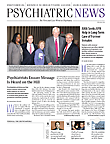Finally, there is a stand-alone diagnostic code to allow clinical tracking and epidemiologic surveillance of fetal alcohol spectrum disorder (FASD)—the most pervasive and preventable neurodevelopmental condition. We were pleased that DSM-5 introduced neurodevelopmental disorder associated with prenatal alcohol exposure (ND-PAE) in the category “Specified Other Neurodevelopmental Disorder” (315.8). Strong insights from our 40 collective years of clinical and forensic experience—from outpatient solo practice to behind the bars of death row—support such a paradigm shift.
A wide range of public health, mental health, and medical professionals agree that ND-PAE is a serious problem. The rate of FASD is conservatively estimated to be at least 9.1 per 1,000 births annually, which means there are approximately 40,000 new cases of ND-PAE in the United States each year.
A 2009 study estimated dysmorphic fetal alcohol syndrome at between 2 per 1,000 births and 7 per 1,000 births, and all levels of FASD at between 2 percent and 5 percent of births in the United States and some countries of Western Europe. These estimates rival the prevalence rates of conditions that receive more emphasis in the lay press, such as Down’s syndrome, spina bifida, cerebral palsy, and autism.
We believe the much-needed single diagnostic code in DSM-5 to account for this population will lead to more-accurate epidemiological prevalence data for affected individuals in community-based settings.
A recent PubMed search of the term “fetal alcohol syndrome” resulted in nearly 4,000 articles. This wealth of knowledge includes, but is not limited to, alcohol-related teratogenicity; neuroanatomic and neuropsychometric changes; functional deficits in cognitive, behavioral, and other neurodevelopmental outcomes; and neuroimaging findings.
One of us (Dr. Rich) presented highlights of this voluminous research in a symposium at the 2009 American Academy of Child and Adolescent Psychiatry’s annual meeting and in a clinical perspectives panel in 2011 at the joint Canadian Academy of Child and Adolescent Psychiatry annual meeting along with other experts in the field. We and others have been speaking at state and national conferences to shift understanding of the diagnostic paradigm away from facial dysmorphology and toward a more clinically relevant transactional conceptualization that incorporates brain, behavior, and environmental factors within a neurodevelopmental focus.
PAE has been linked to intellectual disability as well as to nearly every neurodevelopmental disorder listed in DSM-5 in multiple studies. Similar to the other neurodevelopmental disorders, ND-PAE is best evaluated by thorough neuropsychological testing that includes adaptive behavior assessments with standardized measures such as the Vineland Adaptive Behavior Scales. Deficits in communication, autonomic arousal and mood dysregulation, and peripheral nervous system dysfunction, along with cognitive deficits and/or executive functioning issues in affected individuals make formulation of these cases extraordinarily complex. Appreciating the underlying etiology in ND-PAE makes treatment planning more efficient and informed.
For years, we struggled to fit the countless patients who presented with myriad psychiatric conditions, neuropsychological deficits, and/or intellectual impairment resulting from maternal alcohol use into the cookie-cutter model of DSM-IV-TR. So many of the children, adolescents, and adults affected by PAE mimic other diagnostic symptoms without meeting full criteria and often respond paradoxically to medications or experience extreme side effects.
Due to these patients’ underlying cardiac problems, susceptibility to seizure disorders, and metabolic differences, clinicians should be mindful of potential interactions and contraindications to treatments. We hope that psychiatrists and other mental health professionals will be inspired by the new code (315.8) to develop clinical-trials protocols and research-based treatment guidelines, recognizing the condition as a treatable disorder.
In short, we believe that by further defining ND-PAE as a neurodevelopmental disorder with its own diagnostic code, psychiatrists, epidemiologists, managed care organizations, and other systems of care will be able to quantify the numbers of affected individuals, develop standardized treatment protocols, and target primary-prevention strategies for this tragic and preventable condition. ■

